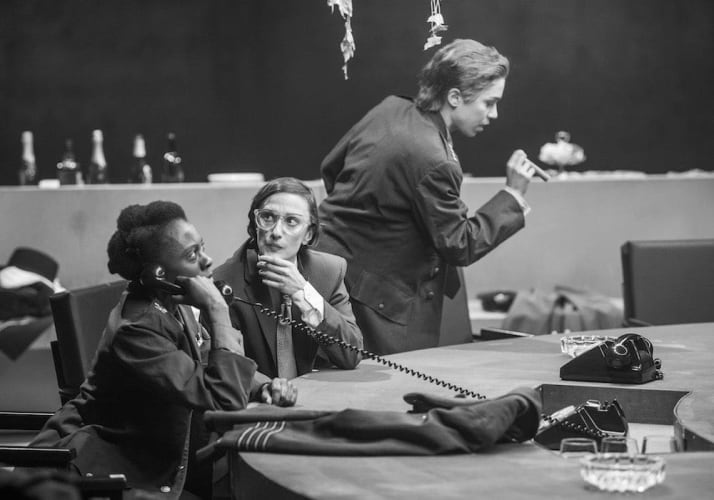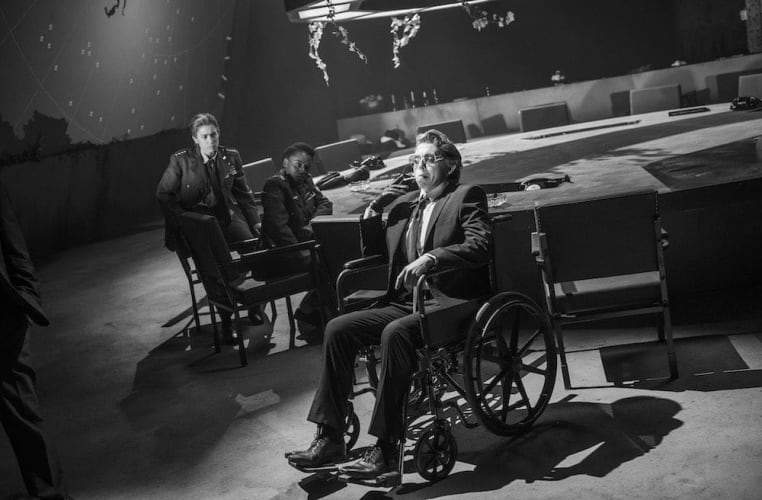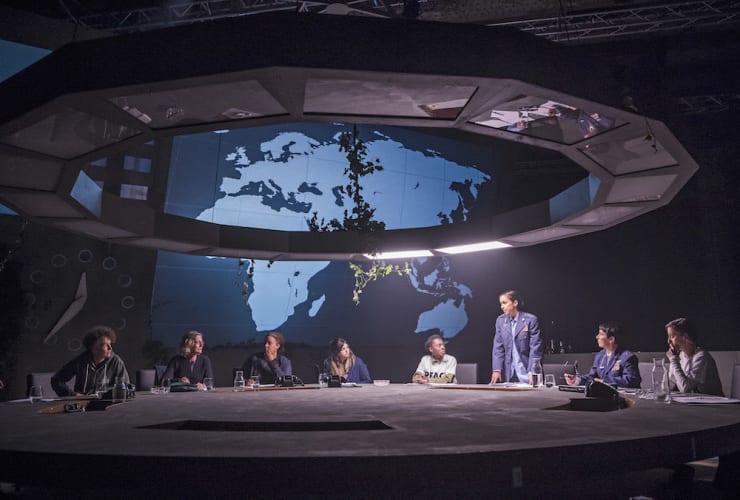What if Women Ruled the World? doesn't seem to have had the attention it deserves as a theatre production, the involvement of two leading figures in British theatre, director Vicky Featherstone and writer Abi Morgan barely getting a mention, but perhaps that is due in part to it being billed as Yael Bartana's "art experiment".
Bartana herself describes it as "a laboratory. The intention is to push the boundaries of the imagination in order to challenge the status quo of patriarchy." The programme thanks the audience for "joining us on the set of Yael Bartana's film experiment".
What it actually is is an artistic collage: a patchwork of approaches to the subject including comic sketches, songs, monologues, genuine discussion of serious subjects with real-life experts and activists and eventually a film—there were cameras on set shooting everything for later use by Bartana. The artist weaves all of these elements together rather than holding a serious discussion after a theatrical presentation as would normally happen.
In the depths of Manchester's abandoned Mayfield railway station (where it's freezing cold even when hot outside, as we discovered at the MIF launch) we observe US leaders (male, but played by female actors) around a gigantic round table in the War Room, inspired by Kubrick's classic film Dr Strangelove, talking partly in gibberish and partly in English—which amounts to more or less the same thing. It's all quite over-the top with some very funny moments and some which are a bit silly.
Then the US President has to call the Russians to tell them that there has been an accident: US planes have been launched in error to attack Russia and if they can't recall them they will have to work together on shooting them down. What happens next indicates that they fail: the actors huddle together and talk about their traumatic experiences since the apocalyptic event. Although well-performed, these speeches aren't as affecting as they could be as they sound more like news reports for the benefit of the audience than genuine dialogue between displaced survivors of nuclear war.
After a slight set and costume change, we are now in the board room of the Doomsday Clock, a genuine concept created by atomic scientists in 1947 to represent the scale of the threat of nuclear war as the number of minutes to midnight on a metaphorical clock. In 2007, threats from climate change and advances in science and technology were added as additional factors. There is a short dramatic scene to introduce the idea that, following the nuclear war, women now outnumber men by 10 to 1 and the women are now in charge and tasked with creating a protocol to reduce further threats to the planet—or at least to human life on it.
The experts are then brought in. Although still part of the dramatic scene, the experts are genuine world authorities and activists, a different group of five women at each performance. They are asked to state clearly what they believe to be the largest threats to the planet at the moment, then they debate, prompted very skilfully by knowledgeable actors, a new protocol for improving the world.
Interspersed with this are monologues from the actors (Nadia Albini, Natasha Gordon, Danusia Samal, Susanne Sachsse and comic relief from Eileen Walsh) about their post-apocalypse experiences and film clips about real moments in history when the threat, shown on the Doomsday Clock, was particularly severe. I wasn't surprised to learn that we were at three minutes to midnight in 1984, as I remember we were all convinced when I was at school that a nuclear war was imminent and we used to discuss what we would do if we heard the mythical "four minute warning".
What was shocking was that the threat level was reduced to 2½ minutes in 2017, its lowest since 1953. This was not due to the terrorist threat that has resulted in bag checks before we are allowed into every performance (although the person who checked my bag seemed most concerned about food and cans) but to President Trump's attitude towards nuclear arms proliferation and climate change.
The expertise of the "real" people brings informed discussion to the table, although some I saw were clearly more used to public debate than others and subjects were dealt with in variable depth. There is some comic banter, especially, at the performance under review, around the semi-naked tea boy (Karl Fletcher, who doesn't warrant a biog in the programme but I've discovered is a model from Stalybridge) and whether his views should be taken into account. There wasn't a great deal of discussion that explicitly debated the female point of view, but it could be argued that this was implicit due to all of the participants being female (apart from Karl, who remained mute).
While not wholly successful from a dramatic point of view, it's a fascinating idea that has plenty to enjoy in the fictional, comic and musical moments (and some beautifully clear and real-sounding gales, clangs and rumbles in Daniel Meir's sound design) and plenty of information and food for thought to take away. And of course you can see it again to get a completely different argument.
In fact this left me with a lot more to think about than the previous night's Fatherland, which one would think would have been aimed more at me and my sex.


